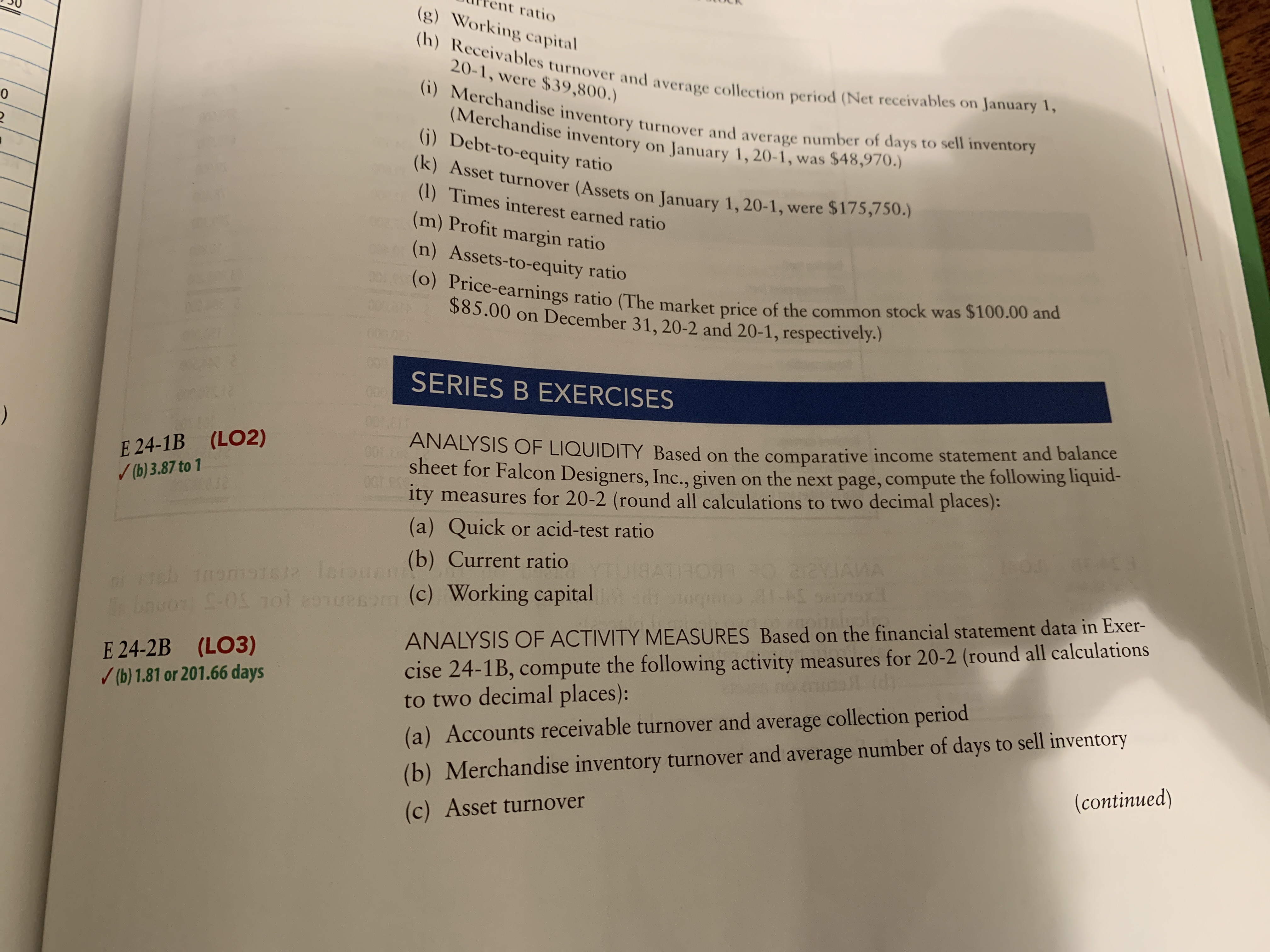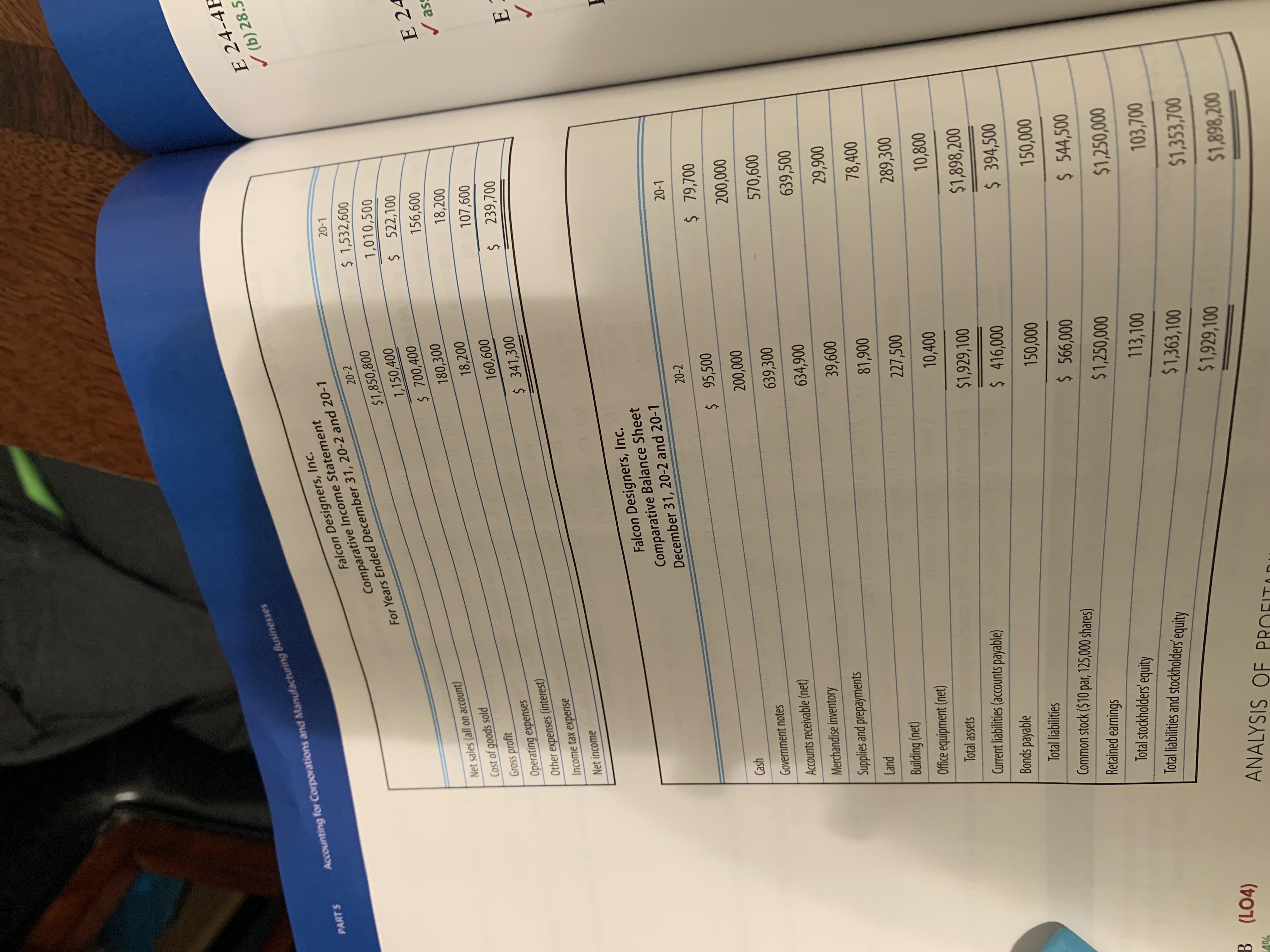
FINANCIAL ACCOUNTING
10th Edition
ISBN: 9781259964947
Author: Libby
Publisher: MCG
expand_more
expand_more
format_list_bulleted
Question
E24-2B

Transcribed Image Text:ent ratio
(g) Working capital
(h) Receivables turnover and average collection period (Net receivables on January 1,
(i) Merchandise inventory turnover and average number of days to sell inventory
20-1, were $39,800.)
(Merchandise inventory on January 1, 20-1, was $48,970.)
(j) Debt-to-equity ratio
(k) Asset turnover (Assets on January 1, 20-1, were $175s50.)
(1) Times interest earned ratio
(m) Profit margin ratio
(n) Assets-to-equity ratio
(o) Price-earnings ratio (The market price of the common stock was $100.00 and
$85.00 on December 31, 20-2 and 20-1, respectively.)
00
000A
SERIES B EXERCISES
0000
E 24-1B (LO2)
/ (b) 3.87 to 1
ANALYSIS OF LIQUIDITY Based on the comparative income statement and balance
sheet for Falcon Designers, Inc., given on the next page, compute
ity measures for 20-2 (round all calculations to two decimal places):
the following liquid-
(a) Quick or acid-test ratio
(b) Current ratio
18ATHORT O 22YJAMA
bovon -05 1o1 2onuenom (c) Working capital
cise 24-1B, compute the following activity measures for 20-2 (round all calculations
to two decimal places):
ANALYSIS OF ACTIVITY MEASURES Based on the financial statement data in Exer-
E 24-2B (LO3)
(b) 1.81 or 201.66 days
(b) Merchandise inventory turnover and average number of days to sell inventory
(continued)
(a) Accounts receivable turnover and average collection period
(c) Asset turnover

Transcribed Image Text:E 24-4E
/ (b) 28.5
Accounting for Corporations and Manufacturing Businesses
PARTS
For Years Ended December 31, 20-2 and 20-1
$1,850,800
Falcon Designers, Inc.
20-1
Comparative Income Statement
20-2
$ 1,532,600
1,010,500
1,150,400
$ 522,100
$ 700,400
156,600
Net sales (all on account)
E 24
180,300
Cost of goods sold
Gross profit
18,200
18,200
ass
107,600
160,600
Operating expenses
$ 239,700
Other expenses (interest)
$ 341,300
Income tax expense
E
Net income
Falcon Designers, Inc.
Comparative Balance Sheet
December 31, 20-2 and 20-1
20-2
20-1
$ 95,500
$ 79,700
Cash
200,000
200,000
Government notes
Accounts receivable (net)
639,300
570,600
Merchandise inventory
634,900
639,500
Supplies and prepayments
39,600
29,900
Land
81,900
78,400
Building (net)
227,500
Office equipment (net)
289,300
Total assets
10,400
10,800
Current liabilities (accounts payable)
$1,929,100
$1,898,200
Bonds payable
$ 416,000
$ 394,500
Total liabilities
150,000
Common stock ($10 par, 125,000 shares)
$ 566,000
150,000
Retained earnings
$ 544,500
Total stockholders' equity
$1,250,000
$1,250,000
Total liabilities and stockholders' equity
113,100
103,700
$1,363,100
B (LO4)
$1,929,100
$1,353,700
40%
ANALYSIS OF PROFITO
$1,898,200
Expert Solution
This question has been solved!
Explore an expertly crafted, step-by-step solution for a thorough understanding of key concepts.
This is a popular solution
Trending nowThis is a popular solution!
Step by stepSolved in 3 steps with 2 images

Knowledge Booster
Learn more about
Need a deep-dive on the concept behind this application? Look no further. Learn more about this topic, accounting and related others by exploring similar questions and additional content below.Similar questions
- Data: So 101; X= 114; 1+r= 1.12. The two possibilities for sr are 143 and 85.arrow_forward10078+0987=arrow_forward102. Four capacitors C1-1uF, C2=2uF, C3=3uF and C4-4uF are connected as given in figure. The potential of junction O is A. 16.5 V B. 18 V C. 15.5 V D. 18.5 V 10 V 5V C₁ # H C3+ CA 20 V 30 Varrow_forward
arrow_back_ios
SEE MORE QUESTIONS
arrow_forward_ios
Recommended textbooks for you

 AccountingAccountingISBN:9781337272094Author:WARREN, Carl S., Reeve, James M., Duchac, Jonathan E.Publisher:Cengage Learning,
AccountingAccountingISBN:9781337272094Author:WARREN, Carl S., Reeve, James M., Duchac, Jonathan E.Publisher:Cengage Learning, Accounting Information SystemsAccountingISBN:9781337619202Author:Hall, James A.Publisher:Cengage Learning,
Accounting Information SystemsAccountingISBN:9781337619202Author:Hall, James A.Publisher:Cengage Learning, Horngren's Cost Accounting: A Managerial Emphasis...AccountingISBN:9780134475585Author:Srikant M. Datar, Madhav V. RajanPublisher:PEARSON
Horngren's Cost Accounting: A Managerial Emphasis...AccountingISBN:9780134475585Author:Srikant M. Datar, Madhav V. RajanPublisher:PEARSON Intermediate AccountingAccountingISBN:9781259722660Author:J. David Spiceland, Mark W. Nelson, Wayne M ThomasPublisher:McGraw-Hill Education
Intermediate AccountingAccountingISBN:9781259722660Author:J. David Spiceland, Mark W. Nelson, Wayne M ThomasPublisher:McGraw-Hill Education Financial and Managerial AccountingAccountingISBN:9781259726705Author:John J Wild, Ken W. Shaw, Barbara Chiappetta Fundamental Accounting PrinciplesPublisher:McGraw-Hill Education
Financial and Managerial AccountingAccountingISBN:9781259726705Author:John J Wild, Ken W. Shaw, Barbara Chiappetta Fundamental Accounting PrinciplesPublisher:McGraw-Hill Education


Accounting
Accounting
ISBN:9781337272094
Author:WARREN, Carl S., Reeve, James M., Duchac, Jonathan E.
Publisher:Cengage Learning,

Accounting Information Systems
Accounting
ISBN:9781337619202
Author:Hall, James A.
Publisher:Cengage Learning,

Horngren's Cost Accounting: A Managerial Emphasis...
Accounting
ISBN:9780134475585
Author:Srikant M. Datar, Madhav V. Rajan
Publisher:PEARSON

Intermediate Accounting
Accounting
ISBN:9781259722660
Author:J. David Spiceland, Mark W. Nelson, Wayne M Thomas
Publisher:McGraw-Hill Education

Financial and Managerial Accounting
Accounting
ISBN:9781259726705
Author:John J Wild, Ken W. Shaw, Barbara Chiappetta Fundamental Accounting Principles
Publisher:McGraw-Hill Education